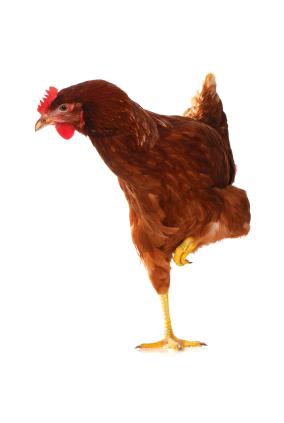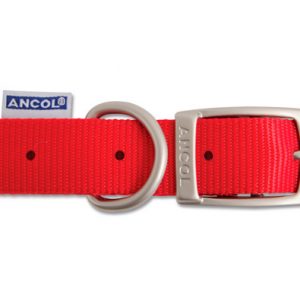Chickens
The keeping of a small group of domestic hens or domestic ducks has become increasingly popular in recent years. Not only do they provide interest and the possibility of bird-human interaction but also a ready supply of eggs.
Being gregarious birds domestic fowl should be kept in small groups. It is not necessary to have a cockerel or drake unless breeding is intended and, of course, cockerels can be noisy and potentially cause upset to near neighbours.
Properly cared for domestic fowl will live for several years, although maximal egg production is only likely for two years or so.
Choosing and buying your fowl A healthy fowl should have:
- A bright and alert appearance
- Smooth and shiny plumage
- Have a clean vent area and produce quite firm droppings
- Free from obvious external parasites
HOUSING
Domestic hens and domestic ducks can be kept in generally the same manner albeit with one or two notable differences. Whatever the enclosure design it must be sufficient to allow for natural foraging behaviour and be of a sufficient size that the ground does not become a quagmire (this is particularly important in the case of ducks).
Domestic hens in particular can be accommodated in a movable wood and mesh ark attached to a hen house thereby ensuring that any grassed area does not become over-used and rife with the build-up of parasites and droppings. Alternatively, more roomy permanent fenced accommodation can be provided. Fencing can be electrified in order to deter foxes but, in any case, domestic fowl should be shut in each night.
Ducks will require either a small pond with an easy means for entering and leaving the water or a water-containing substitute. This is essential in order to allow for the ducks’ behavioural and physiological need to bathe without which feather condition will rapidly deteriorate.
An indoor hen house or duck house constructed of wood and with the roof overlain with roofing felt is essential within the accommodation. This should be positioned on vermin proof concrete or paving slabs or, in the case of movable enclosures can be positioned on top of slightly sunken mesh.
Hen houses will need perching of suitable diameter for the birds to roost on at nights but this will not be used by domestic ducks with the exception of Muscovy Ducks. The general floor space in the house should be covered in a reasonably deep layer of clean wood shavings which must be removed and replaced at regular intervals. Clean straw can also be used in addition or instead of wood shavings. The house should be free from drafts but must have sufficient ventilation so as to stop mould formation and dank conditions.
Hens will require nesting boxes – one per 3-4 hens- within the construction of the hen house in which to lay their eggs. These should be lined with clean hay and inspected daily for removal of eggs. Domestic ducks will not ordinarily use such nest boxes and, instead, the eggs will need to b e removed from the general floor area of the house. Every few months a thorough cleaning and disinfecting of the house should be undertaken.
Care should be taken not to disturb fowl at night. Night fright can cause the birds to fly into the cage wire, so be sure to cover the cage at night.
FEEDING AND WATER
With sufficient space and/or changing of the position of the enclosure, domestic fowl will forage naturally for a high proportion of their dietary intake, especially in the spring, summer and early autumn months. However, this natural diet should be supplemented with additional vegetable material and proprietary feeds especially in the winter months and when rearing young birds.
The commercial feed should be varied in protein levels according to the age and egg-laying status of the birds and, to some extent, also to the breed of fowl being kept. Grain and or crumbs and pellets should be offered but in amounts that are always consumed within one hour or so of being fed. Poultry mash can also be provided for hens but is of limited value for ducks that find it difficult to gather with their bills and which results in a great deal of food wastage. It is particularly advantage to provide any grains provided for ducks presented as floating on a bowl of water.
Mineralised grit is needed in order for the birds to successfully grind their food and oystershell grit in order to help ensure sufficient calcium levels for good egg production.
Fresh water should always be available supplied by a gravity-fed drinker and cleaned regularly in order to avoid algae build-up and contaminated stale water.
GENERAL CARE
Properly cared for your domestic fowl will live a long and happy life and are hardy
Colds – Chilling causes colds. The bird will be listless, with feathers fluffed up and wheezing. Keep in a warm outhouse and consult with your vet.
Diarrhoea – This can be by an excess of green food or, more commonly, mouldy or contaminated food, a change in diet or lack of fresh water.
Mites and lice – Usually the red mite, this is a parasite which feeds on birds’ blood, causing itching and weight loss. Mites are easy to destroy with a suitable spray, your pet shop or vet will advise.
Toenails – Overgrown claws may need to be clipped if they display excessive growth. Care must be taken when cutting nails to avoid cutting the blood vessels and nerves. Consult your vet or pet shop.
Parasitic Worms – if kept in contact with the ground your birds will be susceptible to these and they can be treated regularly to prevent excessive build-up.

Shopping List
- Hen/Duck House
- Fenced enclosure or ark
- Gravity-fed water drinker
- Food containers
- Perches (for hens)
- Poultry mash and grain
- Nest boxes (for hens)
- Hay
- Pond or substitute (for ducks)
- Straw
- Mineral Grit
- Wood shavings
- Oystershell Grit
- Poultry-safe disinfectant
- Book on poultry care

